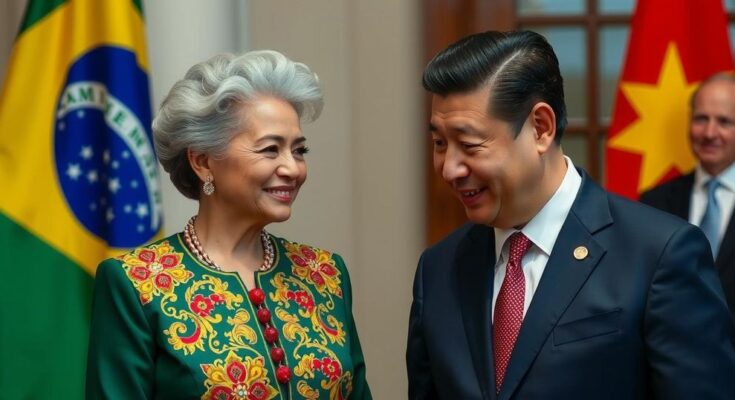Brazil’s President Lula welcomed China’s President Xi for a state visit, reinforcing deepening ties between the two nations through 37 signed agreements. Analysts indicate that relations may strengthen further, especially with Donald Trump anticipated to return to office in 2025. Lula’s outreach aligns with a global shift towards China in Latin America, following a period of diplomatic strain under Bolsonaro. The visit indicates both nations’ commitment to collaborating on various fronts, despite caution regarding broader implications with Western powers.
Brazilian President Luiz Inácio Lula da Silva formally hosted Chinese President Xi Jinping for a state visit at the Alvorada Palace in Brasilia, marking a significant milestone in the burgeoning relationship between Brazil and China. This interaction comes amidst predictions that ties will further strengthen, especially with the anticipated return of Donald Trump to the U.S. presidency in 2025. Since surpassing the United States as Brazil’s primary export market in 2009, China has played a pivotal role in Brazil’s economic landscape, with the two nations recently signing 37 agreements encompassing various sectors such as trade, tourism, and technology.
Experts observe a shifting dynamic in Latin America, where China increasingly fills the void left by perceived neglect from the United States and European Union. Flavia Loss, an international relations professor, underscored this sentiment, noting that the election of Trump appears to amplify this trend of alignment between Brazil and China. Previously, Brazil experienced diplomatic strains under former President Jair Bolsonaro, whose administration exhibited skepticism towards China. Lula’s proactive outreach in 2022 aimed to mend these ties, which he deems essential for Brazil’s reintegration into global affairs following a phase of isolation.
During this latest visit, President Lula emphasized the significance of Brazil and China’s partnership and its global implications, especially within frameworks such as the United Nations and the BRICS grouping. In the backdrop of the two leaders’ discussions, trade volumes between Brazil and China reached approximately $136.3 billion from January to October 2024, highlighting the depth of these economic ties.
Additionally, while China has proposed that Brazil join its Belt and Road Initiative, Brazilian officials remain judicious about the possible implications of deeper alignment with Chinese infrastructure projects. Experts assert that, although Brazil seeks to engage robustly with China, there exists a careful assessment of limits to avoid jeopardizing relations with Western nations. Overall, this visit signifies a gradual yet strong pivot towards closer collaboration between Brazil and China at a time of global restructuring.
The relationship between Brazil and China has evolved significantly over the past decade. Initially, it was marked by strong trade ties after China overtook the U.S. as Brazil’s top trading partner in 2009. However, the diplomatic landscape shifted under Jair Bolsonaro’s leadership, which resulted in strained interactions. President Lula has since prioritized repairing and enhancing these relations, viewing closer cooperation with China as vital for Brazil’s economic and geopolitical positioning in a changing world. The increasing influence of China in Latin America, particularly in light of American foreign policy dynamics, further underscores the importance of this partnership.
In conclusion, the state visit of President Xi Jinping to Brazil underlines the strengthening of diplomatic and economic ties between these two nations. With Brazil actively seeking to re-establish its international standing and China’s role as a growing economic power, the implications of their collaboration are substantial, not only for the two countries but for the broader geopolitical landscape. Cautious engagement with Chinese infrastructure initiatives points to Brazil’s commitment to balancing its relationships with major global players.
Original Source: www.livemint.com




